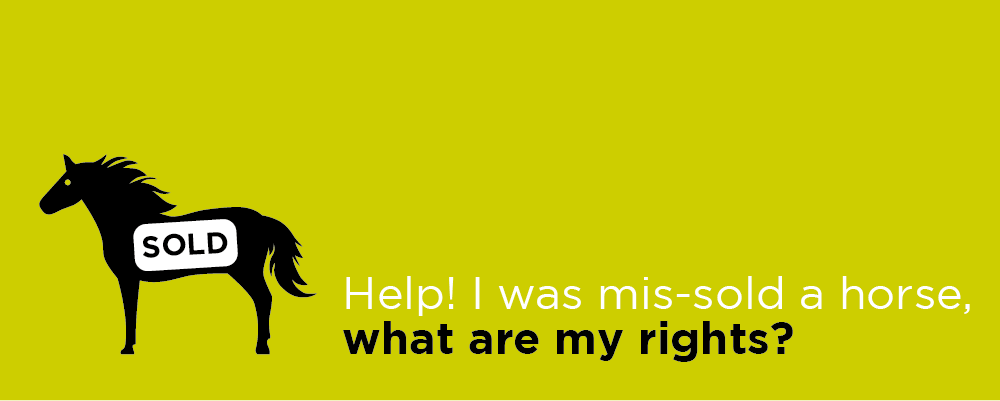- Basildon 01268244144
- Chelmsford 01245453800
- Colchester 01206217300
- London 020 4586 1280

Whether you are buying your first horse or buying another, the process can be a minefield. Dodgy dealers and adverts which stretch the truth can leave buyers with a horse that is far from what they were looking for and sometimes hundreds, if not thousands, out of pocket.
It is desirable that a buyer and seller have a written contract in place outlining the terms of the purchase, however, it is more common than not that the purchase is concluded on a handshake. Whether you sign the dotted line or shake hands, it is fundamental that both the seller and the buyer know their position when it comes to buying and selling a horse.
This article outlines the relevant statutory provisions you should be aware of as a buyer or seller.
The Consumer Rights Act 2015 (CRA)
The CRA applies to private individuals acting outside of the course of business, their trade, craft or profession and purchasing from an individual in the course of business, their trade, craft or profession (such as a business). The CRA covers the sale and purchase of goods, services and digital content. Horses would fall within the definition of ‘goods’ under the CRA.
The CRA introduced certain standards that a reasonable person would deem satisfactory.
- The horse must be of satisfactory quality.
- The horse must match any description given to the buyer.
- The horse must be fit for the purpose it was bought for.
Whether there is a contract in writing or not, the agreement shall include implied provisions created by the CRA.
One of the implied terms is that the horse must match the description given. For example, if a dealer posts an advert online or confirms verbally the horse is a ‘novice ride’ and the horse turns out to be very ‘green’, this may give rise for the buyer to make a claim under the CRA. Further, it is common that the buyer will express what they want the horse for, such as eventing or maybe a ‘happy hacker’. If the buyer expresses the particular purpose they are purchasing the horse for, the horse must be fit for that particular purpose. Again, if the horse turns out to not fit that purpose, this may give rise for a claim under the CRA.
In the first instance, should the horse not be of satisfactory quality, not match the description given or not be fit for purpose, the buyer may have the short-term right to reject the horse. Should the buyer exercise their short-term right to reject the horse, the seller must then refund the buyer in full within 14 days after the seller agrees the buyer is entitled to the refund. Should the buyer lose their right to reject, there may be alternative routes the buyer can explore.
Consumer Contract Regulations 2013 (CCR)
Some may purchase horses unseen due to the location of the horse. In this scenario, the CCR provides protection for private individuals by giving the buyer the right to cancel within 14 days from the date the horse is in the physical possession of the buyer. The buyer may exercise this right simply because they have had a change of heart.
Sale of Goods Act 1979 (SGA)
The SGA may apply where both the buyer and seller are both acting in the course of business. Similar to the CRA, the SGA imposes implied terms in relation to satisfactory quality, and fit for purpose and the horse is sold to the buyer as described.
Misrepresentation Act 1967 (MA)
Buyers may have numerous conversations with the seller before they conclude the sale. Should a false statement be made during those conversations (verbally or written), this may be a misrepresentation. The fundamental element here is that the statement must be made before the sale. The statement made can be made innocently, negligently or fraudulently. A misrepresentation may make a contract voidable. Regardless of what type of misrepresentation has been committed, the innocent party may choose to rescind or affirm the contract.
Summary
The above is just a brief overview focusing on the rights of the buyer when purchasing a horse. It is sensible for the buyer to make careful notes of any pre-contractual conversations and express to the seller what purpose they are buying the horse for. In turn, the seller should be careful not to express any description of the horse which may not be strictly true.
If you have any queries or require assistance in relation to the mis-selling of horses or any other equine-related matters, please contact me on 01245 453844 or at charlotte.burkert@birkettlong.co.uk.



Comments